
| The 2007 European School of High-Energy Physics | 
|
|---|

| The 2007 European School of High-Energy Physics | 
|
|---|
Trest, Czech Republic
|
|---|
 |
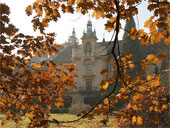 |
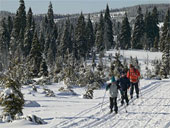 |
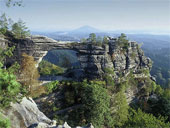 |
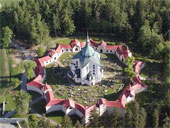 |
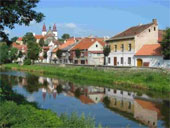 |
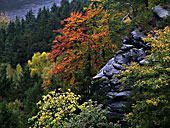 |
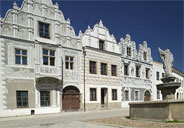 |
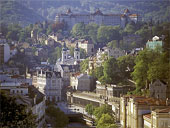 |
Monumental buildings and beautiful nature
The 2007 European School of High-Energy Physics (formerly the CERN-JINR School of Physics) will be jointly organized by the Joint Institute for Nuclear Research (JINR), Dubna, Russia, and the European Organization for Nuclear Research (CERN), Geneva, Switzerland together with the Academy of Sciences, and Charles University, Prague.
The European School of High Energy Physics is targetted particularly at students in experimental HEP who are in the final years of work towards their PhDs. Other schools, such as the CERN-FNAL Hadron Collider Physics School [http://cern.ch/hcpss
], may provide more appropriate training for young postdocs in experimental HEP, PhD students who have already attended the European school, and senior PhD students in HEP phenomenology.
Preference will be given to students who have connections with CERN and JINR member states either because of their nationality, or because of their institutional affiliation, or because they are involved in an experimental programme at a laboratory located in one of the member states.
The Schools of Physics are designed to give a survey of up-to-date information, rather than to be a training course. An outline of each of the lecture courses and reading lists will be published on the web. It should be noticed that some pre-knowledge of the subjects is necessary in order to be able to profit fully from the lecture courses.
School Poster in jpg format (0.5 MB):
Poster1, and in pdf format (1.3 MB):
Poster2
|
|
|
|---|
The 15-th European School of High-Energy Physics will be held from August 19 to September 1, 2007 in Trest, Czech Republic.
Trest is located very close to midway between Prague and Vienna following the most direct road. See the red arrow in the middle right at the linked map
The following links could also be consulted:
http://www.crwflags.com/fotw/flags/cz-ji-tr.html and
http://www.fzu.cz/activities/conferences/ssp9/trest/Trest.jpg
Trest is the second biggest centre in the Vysocina Region, also knows as the Jihlava region, located in the south-eastern part of the historical region of Bohemia and partly in the south-west of the historical region of Moravia. The original village was established at the end of the 12th Century on the left bank of the small river Trestice. The lectures will be given in the Trest Chateau Hotel, Hotel Zamecky.
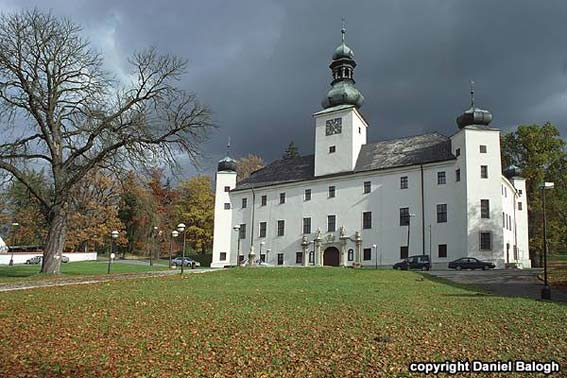
The Trest castle as from the school poster
This Renaissance Castle was built in the 16th century of the right bank of the river Trestice.
The town, at an altitude of 584 meters, has a rich cultural and sports base. The Hotel is located in a calm environment surrounded by the hills of the Czech-Moravian Heights. This province is knows as one of the clearest fresh air area in the Czech Republic.
The weather in August is usually sunny with dominant wind coming from the West and the average temperature is around 16ºC.
|
|
|
|---|
Hotel Zamecky welcome the School participants at:
http://www.zamek-trest.cz/uk/welcome.html
The hotel is situated close to the center of Trest, and the entire hotel is reserved for the School’s students, faculty and staff. Students will share double rooms with bathroom. The lecture hall and the rooms for the discussion sessions are also situated in the hotel, which will be equipped with computing and electronic communication facilities. All the meals will be served in the large dining room of the Hotel.
|
|
|
|---|
| The Highest Energy Cosmic Rays | James Watson CRONIN, University of Chicago |
| From the Peas of Gregor Mendel to the Human Genome | Vaclav PACES, President, Academy of Sciences of the Czech Republic |
| Field Theory and Standard Model | Ronald KLEISS, University of Nijmegen |
| QCD | James STIRLING, University of Durham |
| Flavour Physics and CP Violation | Thomas MANNEL, University of Siegen |
| Introduction to Physics beyond the Standard Model | John ILIOPOULOS, Ecole Normale Supérieure, Paris |
| Neutrino Physics | Hitoshi MURAYAMA, University of California |
| Cosmology and Astrophysics | Michael TURNER, University of Chicago |
| Heavy Ion Physics | Urs WIEDEMANN, CERN |
| Getting prepared for Beams in the LHC | Philippe LEBRUN, CERN |
| Final Preparations for the LHC Experiments | Jos ENGELEN, CERN |
| Preparations for LHC at JINR | Alexei SISSAKIAN, JINR |
Draft Programme
There will be thirty four lectures in all, each lasting about 75 minutes, with additional time for questions and discussion.
Students will be encouraged to present their current research work in the form of a special poster session that is planned for Thursday August 23.
|
|
|
|---|
| Tomas Brauner | Prague |
| Helmut Eberl | HEPHY, Vienna |
| Michal Malinsky | University of Southampton |
| John Swain | Northeastern University |
| Oleg Teryaev | JINR, Dubna |
| Alexander Kupco | Prague |
On Saturday 25 August there will be a one-day excursion to Prague with sightseeing and a guided tour through the town in addition to freetime and dinner.
|
|
|
|---|
|
|
|
|---|
|
|
|
|---|
A Map of the Czech Republic can be found at:
http://www.fzu.cz/activities/conferences/ssp9/trest/CzechRepublic.jpg
and Trest is located close to Jihlava where the road to Vienna leaves the main road between Prague and Bratislava. Trest is 120 km away from Prague and roughly the same distance from Vienna, Austria.
|
Local Committee:
J. Cvach (Academy of Sciences, Prague)
J. Dolejsi (Charles University, Prague)
J. Hosek (Academy of Sciences, Prague) local Co-Director
R. Leitner (Charles University, Prague) local Co-Director
M. Lokajicek (Academy of Sciences, Prague)
M. Pachr (Czech Technical University, Prague)
V. Petracek (Czech Technical University, Prague)
International Advisors:
All enquiries and correspondence related to the School of Physics
should be addressed to one of the Organizing Secretaries:
| Tatyana Donskova International Department Joint Institute for Nuclear Research RU-141980 Dubna, Moscow Region Russia |
Danielle Métral Schools of Physics CERN/DSU CH-1211 GENEVA 23 Switzerland |
| Tel: + 7 496 21 63448 | Tel: + 41 22 767 9141 |
| Fax: + 7 496 21 65891 | Fax: + 41 22 767 5460 |
| E-mail: phs@jinr.ru | E-mail: physics.school@cern.ch |